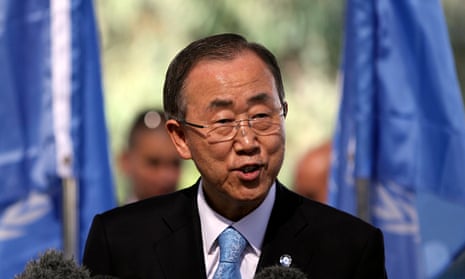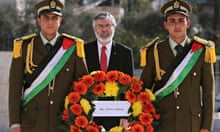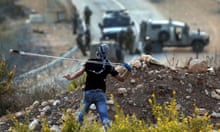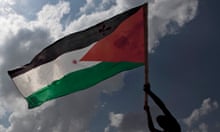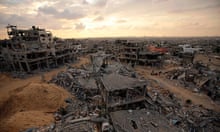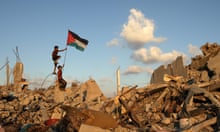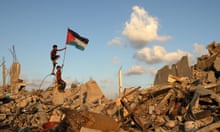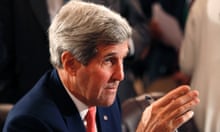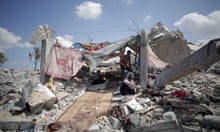The UN secretary general, Ban Ki-moon, described the destruction in Gaza from the recent conflict with Israel as “beyond description” and a source of “shame to the international community” as he visited the war-devastated coastal strip on Tuesday.
Urging a speedy reconstruction effort, he announced that Israel was permitting the first truckloads of construction materials to enter the coastal strip, which has been blockaded by Israel and Egypt since before the conflict.
“I am here with a heavy heart,” Ban told a press conference. “The destruction which I have seen coming here is beyond description,” he added.
Ban said the damage was far worse than what he had seen after the previous conflict – Operation Cast Lead – that took place in 2008-09.
The UN chief was driven through the ruins of Gaza City’s Shuja’iya neighbourhood and visited a school in nearby Jabaliya refugee camp, scenes of some of the heaviest Israeli shelling in this summer’s conflict.
Two classrooms at the UN school were hit by shells, killing at least 14 people sheltering there. Relatives of the dead held up posters showing their loved ones, while waiting to catch a glimpse of the UN head.
Ban saved his strongest language for the deaths of about 500 children during the war. “I met so many of the beautiful children of Gaza. More than 500 were killed in the fighting – many more were wounded. What did they do wrong? Being born in Gaza is not a crime.”
Criticising both Israel and Hamas, he added: “Perhaps nothing so powerfully symbolises this summer of suffering than the Jabaliya school. Thousands of women, children, families were forced to flee the intense hostilities. They sought sanctuary under the UN flag. All of the details related to the location of this facility were shared with Israeli authorities again and again. Yet the shells fell.”
Ban was visiting Gaza two days after donor states pledged $5.4bn in aid for rebuilding after the summer’s devastating Israeli offensive.
In his short tour of the strip, conducted under tight security, Ban visited areas that were heavily bombarded by Israel during the 50-day war, in which more than 2,100 Palestinians, most of them civilians, were killed. Sixty-seven Israeli soldiers and six civilians in Israel were killed by Hamas rockets and other attacks.
Tens of thousands of Palestinians remain displaced by the destruction, and on Tuesday people camping outside their ravaged homes were seen waving at the convoy of white UN vehicles as it passed.
The UN agency UNRWA has estimated it will cost $1.6bn to rehouse the displaced and bring relief to Gaza’s economy, which has been strangled by a seven year-long Israeli – and more recently – Egyptian blockade.
As Ban entered Gaza through the Erez crossing, Israel announced it was allowing 600 tonnes of cement, 50 truckloads of gravel and 10 truckloads of steel into Gaza for rebuilding homes and public buildings, with shipments being monitored by the UN and the Palestinian Authority.
At least 200 tonnes of cement had already reached Gaza through the Kerem Shalom crossing with Israel, Palestinian officals said.
During a question-and-answer session with journalists, Ban insisted that those “who have committed criminal acts, those who have violated international humanitarian law must be investigated and brought to justice”.
“As you know, the UN Human Rights Council has established a commission of inquiry, which is now investigating. Upon our strong urging the government of Israel has established their own independent, criminal investigations. I, as secretary general of the United Nations, am considering establishing my own board of inquiry to investigate the shelling of the UN facilities and killing of UN staff. With all these three commissions and boards of inquiry I am sure we will be able to find and bring justice.”
On Monday, Ban criticised Israel for its continued building of settlements on land the Palestinians seek for an independent state and urged both sides to return to meaningful negotiations as soon as possible. Ban, who last visited the territory in 2012, said at a donor conference in Egypt on Sunday that his trip to the Palestinian enclave was “to listen directly to the people of Gaza”.
The provision of reconstruction aid will be overseen jointly by the UN and the West Bank-based Palestinian Authority, amid concerns that unchecked imports could fall into the hands of militants, including those of Hamas, the de facto power in Gaza against which Israel waged its military operation.
